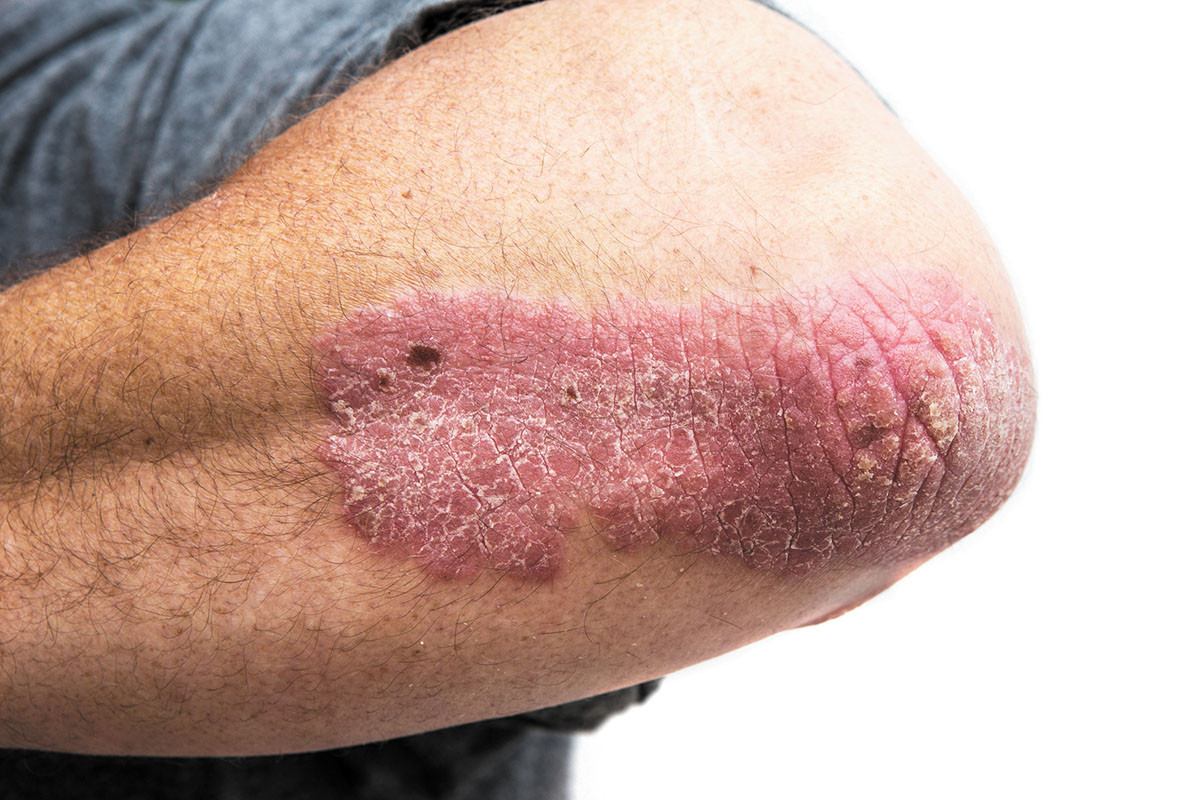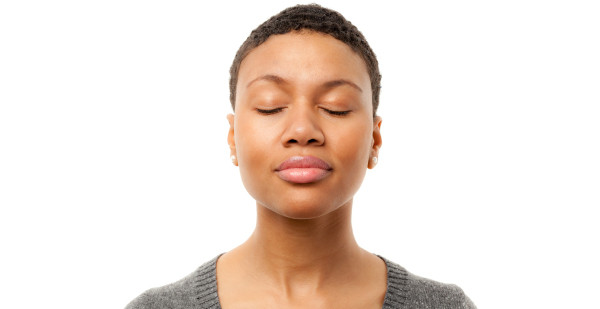
Trying to lose weight? Be careful not to lose muscle

Is your skin problem actually an autoimmune condition?

People with diabetes face higher risk of hearing loss

Antibiotic-free fixes for recurrent UTIs

Musculoskeletal syndrome of menopause: When menopause makes you ache all over

When can older women stop getting mammograms?

To lose weight, especially harmful belly fat, combine diet and exercise

Can men hold off on treating recurring prostate cancer?

The 7 types of rest and why we need them all

What are the early warning signs of cervical cancer?
Alternative & Integrative Health Archive
Articles
A deeper look at psoriasis
There are ways to shorten flare-ups and, in some people, prevent them from recurring.
Image: © JodiJacobson/Getty Images
Psoriasis is a big star on TV drug ads, but this autoimmune skin disease is something most people try to keep well hidden.
"Psoriasis is among the most common skin conditions, affecting about 2% of the U.S. population, and while the condition doesn't affect everyone the same way, the approach to treatment and prevention is often similar," says Dr. Gideon Smith, an assistant professor of dermatology at Harvard-affiliated Massachusetts General Hospital.
The drug-free approach to pain management
You have many alternatives for treating and controlling pain.
The opioid epidemic continues to rise in America, and a 2017 report from the National Initiative for the Care of the Elderly suggests the crisis now affects more older adults.
A main reason for the growing addiction to pain medicine is the ease with which it is often prescribed, according to Dr. Robert Jamison, a professor of anesthesia and psychiatry with Harvard-affiliated Brigham and Women's Hospital.
A new app can help you chose herbal supplements wisely
Research we're watching
Wondering if that herb or herbal supplement is safe and effective? A new app can tell you. The National Center for Complementary and Integrative Health has introduced a new app called HerbList, which provides research-based information on various herbal products.
The app, which is available free on the Apple App store and Google Play store, is designed to give consumers important details on the safety and effectiveness of some of the most popular herbs and herbal supplements. While marketers may claim these products bring health benefits and are safe, that might not always be the case. This app can help you sort through the claims to determine what's real — and what's not.
Is whole-body cryotherapy effective and safe?
Ask the doctors
Q. A friend of mine recommended I try whole-body cryotherapy for arthritis pain. Is this technology proven to work?
A. Whole-body cryotherapy is a technology designed to cool the body by exposing it to subzero temperatures (typically –200° to –300° F) for short sessions of two to four minutes. In some cases, people sit in a cold room; in others, they are placed in a special enclosure that cools them from the neck down. The theory behind cryotherapy is that cold temperatures can reduce inflammation and swelling in the body — much like an ice pack would on your swollen ankle. People who promote cryotherapy claim it can help treat symptoms related to numerous conditions, including arthritis, asthma, depression, and chronic pain, among others. They also claim that whole-body cryotherapy can aid in weight loss, soothe sore muscles, boost metabolism, and even get your blood circulating more efficiently. But while that may sound great, there's really no scientific proof that whole-body cryotherapy is safe, or any evidence to support claims about its health benefits, according to the FDA. And the FDA has not cleared or approved any whole-body cryotherapy device to treat any medical condition. In short, whole-body cryotherapy is still unproven and could potentially bring risks, so if you are considering using the technology, it's a good idea to discuss the decision with your doctor first.
Managing your medications before a medical procedure
You may need to stop taking blood thinners, certain painkillers, herbs, and supplements to reduce your risk for bleeding.
Image: © Steve Debenport/Getty Images
No one wants to have surgery, even minor surgery, but sometimes minor procedures, such as a tooth extraction or a colonoscopy, are unavoidable. When that happens, you may hear that it's important to stop taking certain medications. Understanding exactly which drugs to suspend — and when — can be confusing. "I get a lot of questions about this," says Joanne Doyle Petrongolo, a pharmacist at Harvard-affiliated Massachusetts General Hospital.
Blood thinners
All surgery involves cutting body tissue, and that leads to bleeding. Blood thinners—medications like anticoagulants and antiplatelet drugs—can boost the risk for bleeding by keeping the blood from clotting.
Yoga can help with low back pain relief
In the journals
Image: © Wavebreakmedia Ltd/Thinkstock
Low back pain? Try yoga. A study published online July 20, 2017, by the American Journal of Preventive Medicine found that low back pain sufferers who completed a 12-week yoga program reported less pain and better quality of life compared with those who received standard care, such as medication, physical therapy, and exercise.
The study specifically looked at military veterans, average age 53, 74% of whom were men, who had experienced chronic lower back pain for at least six months. The 12-week program consisted of two hour-long instructor-led yoga sessions per week, with home practice encouraged. The sessions emphasized poses to stretch and strengthen the core and improve joint mobility. Relaxation and breathing techniques helped to reduce tension and pain perception.
8 non-invasive pain relief techniques that really work
| Image: Bigstock |
Sometimes pain has a purpose — it can alert us that we've sprained an ankle, for example. But for many people, pain can linger for weeks or even months, causing needless suffering and interfering with quality of life.
If your pain has overstayed its welcome, you should know that you have more treatment options today than ever before. Here, we've listed eight techniques to control and reduce your pain that don't require an invasive procedure — or even taking a pill.
Herbs and your heart: Be cautious
Dietary supplements may be natural but not risk-free.
Image: © darios44/Thinkstock
A quick stroll through your pharmacy or supermarket wellness aisle will show you that dietary supplements and herbal remedies are big business. Americans spend over $32 billion annually on thousands of herbal products, many of which claim to improve heart health.
Popular misconceptions
People look to herbs and supplements as a natural, safe alternative to the conventional medications they're taking, says Dr. Pieter Cohen, an assistant professor of medicine at Harvard Medical School. Providers, on the other hand, may think of supplements as fancy placebos — expensive but benign. "These are all misconceptions," says Dr. Cohen.
Treating anxiety without medication
| Image: iStock |
If you suffer from anxiety, the constant, nagging feelings of worry can be troubling and hard to control. These feelings are usually intense and out of proportion to the actual troubles and dangers in your everyday life. They can make it hard to function at home, at work, or in social situations.
Anxiety can be treated with medication, but several mind-body approaches may also be effective.

Trying to lose weight? Be careful not to lose muscle

Is your skin problem actually an autoimmune condition?

People with diabetes face higher risk of hearing loss

Antibiotic-free fixes for recurrent UTIs

Musculoskeletal syndrome of menopause: When menopause makes you ache all over

When can older women stop getting mammograms?

To lose weight, especially harmful belly fat, combine diet and exercise

Can men hold off on treating recurring prostate cancer?

The 7 types of rest and why we need them all

What are the early warning signs of cervical cancer?
Free Healthbeat Signup
Get the latest in health news delivered to your inbox!
Sign Up











